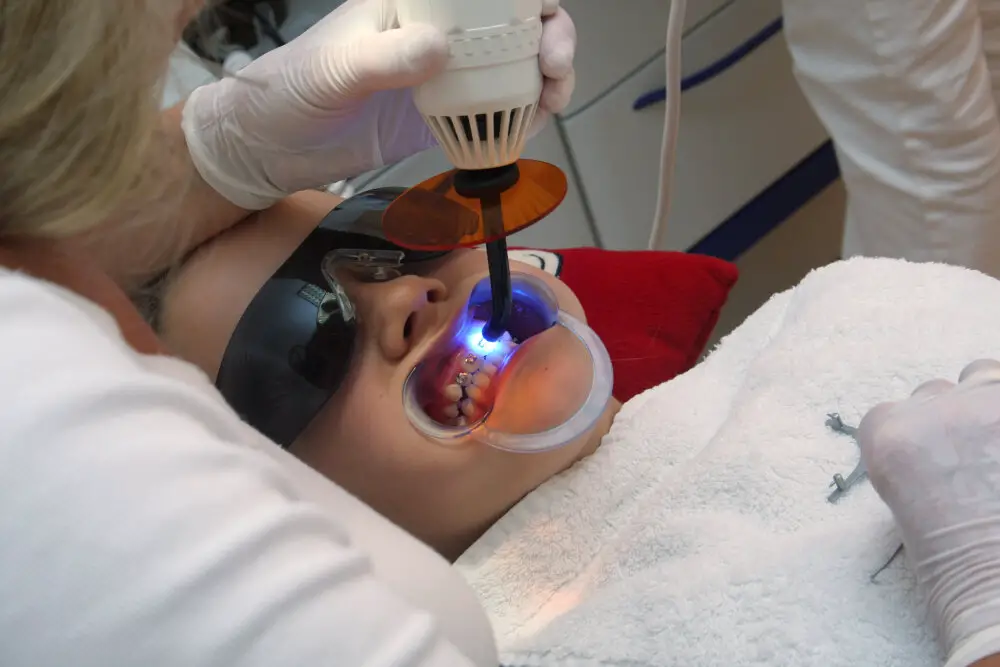Closing Time: How Long Does it Take for Wisdom Teeth Holes to Heal?

Wisdom teeth are the third molars that typically erupt between the ages of 17 and 25. While some people do not experience any problems with their wisdom teeth, others may require surgical extraction. This procedure involves removing one or more wisdom teeth from the jawbone. After the extraction, it is common for patients to experience some discomfort and pain, and they may wonder how long it will take for the wisdom teeth holes to heal. The healing process of wisdom teeth holes can vary from person to person, depending on several factors such as age, overall health, and the extent of the surgery. However, on average, it takes around two weeks for the holes to heal completely. During this time, patients are advised to follow their dentist’s post-operative instructions carefully to prevent complications such as infections or dry sockets. In this article, we will delve deeper into the healing process of wisdom teeth holes and discuss some tips for a speedy recovery.
Wisdom teeth, also known as third molars, are the last set of teeth to emerge in the back of the mouth. Sometimes, they can cause pain, infection, and overcrowding, which is why they are often recommended for removal. The procedure involves making an incision in the gum line and removing the tooth from its socket. After removal, the healing process can take anywhere from a few days to a few weeks, depending on the individual’s age, health, and the complexity of the extraction. During this time, it is essential to follow proper aftercare instructions, such as avoiding hard foods, keeping the area clean, and taking any prescribed medication. In general, the healing process involves the formation of a blood clot, followed by the growth of new tissue and bone to fill the socket left by the tooth. With proper care and attention, most people can expect to fully heal within a few weeks after wisdom teeth removal.
Understanding healing time is crucial in managing any surgical procedure, including wisdom teeth removal. Healing time is the duration required for the body to repair and recuperate from the surgical procedure fully. When it comes to wisdom teeth removal, the healing time varies depending on the individual’s age, health status, and the extent of the procedure. It is imperative to understand the healing time to ensure that the recovery process is smooth and without complications. Failure to comprehend the healing time may lead to complications such as bleeding, infections, and dry sockets, which can prolong the healing process. It is also essential to follow the post-operative instructions provided by the dentist or oral surgeon to promote faster healing and minimize discomfort. Overall, understanding healing time is critical to ensure that the recovery period is safe, effective, and without complications.
Healing Timeline

The healing timeline for wisdom teeth holes can vary depending on a few factors. Typically, it takes about 1-2 weeks for the initial healing process to occur. During this time, the body will begin to form a blood clot over the extraction site, which helps to protect it and start the healing process. However, it is important to note that everyone’s healing timeline is unique and can be affected by factors such as age, overall health, and the complexity of the extraction procedure. After the initial healing process, the body will continue to repair and regenerate tissue in the area. Over the next few weeks, the blood clot will gradually be replaced by new tissue and bone, and the gum tissue will start to close over the extraction site. The amount of time it takes for full healing to occur can range from a few weeks to several months, depending on the individual’s healing process. It is important to follow post-operative care instructions from your dentist, such as avoiding certain foods and activities, to ensure proper healing and prevent complications.
The healing process for wisdom teeth removal involves several stages that can take anywhere from a few days to several weeks. Immediately after the extraction, a blood clot will form in the socket and the surrounding tissues will start to heal. Over the next few days, the clot will solidify and new tissue will grow to cover the hole left by the tooth. This will help to protect the underlying bone and nerves while also preventing food and debris from getting trapped in the socket. As the healing process continues, the area will gradually fill in with new bone and tissue until it is completely healed. Patients may experience some discomfort, swelling, and bleeding during this time, but these symptoms can usually be managed with pain medication and proper oral care. It is important to follow the aftercare instructions provided by your dentist or oral surgeon in order to ensure a smooth and speedy recovery.
The healing process for wisdom teeth removal typically occurs in different stages that vary in duration. The first stage is the initial healing phase that takes about one to two weeks, where the blood clots in the sockets form and provide protection for the underlying bone and nerves. The second stage is the granulation tissue formation phase that lasts about two to three weeks, where new connective tissue and blood vessels begin to develop. The third stage is the remodeling phase, which lasts around four to six weeks, where the granulation tissue is replaced by firmer, more durable tissue. The final stage is the maturation phase, which can last up to several months, where the newly formed bone continues to mature and strengthen. It’s essential to follow post-operative instructions to ensure proper healing and avoid complications.
The healing time of wisdom teeth holes can be influenced by a variety of factors, including the individual’s age, overall health, and lifestyle habits. Younger individuals tend to heal faster than older adults due to their more robust immune systems and faster cell turnover rates. Chronic illnesses and immune disorders may also slow down the healing process. Smoking or consuming alcohol can delay healing and increase the risk of infection. Good oral hygiene practices, such as regular brushing and flossing, can aid in the healing process by keeping the area clean and free of bacteria. The size and complexity of the extraction can also affect healing time, with larger or more complicated extractions taking longer to heal. It’s essential to follow your dentist’s aftercare instructions carefully to ensure optimal healing and a speedy recovery.
Pain and Discomfort

Pain and discomfort are common after-effects of wisdom teeth extraction surgery. These symptoms usually persist for several days or even weeks post-surgery. Pain is one of the primary reasons why people avoid wisdom teeth extraction surgery. However, it is important to note that the pain can be managed with the help of medication prescribed by the dentist or oral surgeon. Over-the-counter painkillers may also help, but it is important to consult with a healthcare professional before taking any medication. Apart from pain, discomfort is also common after wisdom teeth extraction surgery. Discomfort can arise due to swelling, bruising, and soreness in the mouth. The discomfort can make it difficult to eat, speak, and even sleep. However, there are several ways to manage discomfort post-surgery. Applying a cold compress to the affected area can help reduce swelling and discomfort. Additionally, rinsing the mouth with warm salt water can help keep the area clean and promote healing. It is essential to follow the dentist’s instructions carefully to ensure a speedy recovery and alleviate pain and discomfort.
During the healing process of wisdom teeth extraction, common pain and discomfort might be experienced due to various reasons. Firstly, the removal of the tooth can cause soreness and tenderness in the surrounding gums, which can last for a few days or even up to a week. Secondly, the formation of a blood clot in the extraction site can cause pain if it is dislodged or broken, leading to a dry socket. Lastly, the jaw muscles can become stiff and sore due to keeping the mouth open during the procedure. Painkillers and ice packs can be used to alleviate these symptoms, and it is essential to follow the post-operative instructions given by the dentist to ensure a smooth healing process.
Managing pain and discomfort is an essential aspect of the healing process after wisdom teeth extraction. To alleviate pain, over-the-counter painkillers such as ibuprofen or acetaminophen may be used, as well as prescription medications if necessary. Applying ice packs to the affected area can also help reduce swelling and numb the pain. It is also recommended to avoid smoking, using a straw, or consuming any hot or spicy foods or drinks until the area has fully healed. Maintaining proper oral hygiene, including gentle brushing and rinsing with saltwater, can also help prevent infection and promote healing. Staying hydrated, getting enough rest, and avoiding strenuous activities can also aid in the healing process. If you experience severe or prolonged pain, or any other concerning symptoms, you should consult with your dentist or oral surgeon.
Aftercare and Maintenance

Aftercare and maintenance are crucial aspects of the healing process after wisdom teeth extraction. Proper aftercare can help promote healing, prevent infection, and reduce discomfort. Immediately after surgery, it is important to follow the dentist’s instructions to ensure that the healing process goes smoothly. Patients should avoid smoking, drinking through a straw, and consuming hard or crunchy foods for several days after surgery. They should also use ice packs to reduce swelling and take pain medication as prescribed by their dentist. Good oral hygiene is also critical during the healing process. Patients should rinse their mouth with warm saltwater several times a day and brush their teeth gently, avoiding the extraction site. In addition to aftercare, maintenance is also important to ensure long-term oral health. Patients should continue to practice good oral hygiene, including brushing and flossing regularly. They should also attend regular dental checkups to monitor the healing process and detect any potential issues early on. In some cases, dentists may recommend additional treatments, such as antibiotics or dental implants, to prevent complications and restore the patient’s oral health. By following proper aftercare and maintenance protocols, patients can promote healing, reduce discomfort, and maintain good oral health long after their wisdom teeth extraction procedure.
Proper aftercare for healing is crucial for anyone who has undergone a surgical procedure, including wisdom teeth extraction. After the removal of wisdom teeth, the patient’s mouth will experience some swelling and discomfort, which can be alleviated by following the proper aftercare instructions. These instructions may include taking medication, applying ice to the affected area, and avoiding hard or crunchy foods. The mouth must also be kept clean to prevent infection, which can be achieved by gently rinsing with saltwater and keeping the area free of debris. Neglecting proper aftercare can extend the healing process and lead to complications such as dry socket, which is a painful condition that occurs when the blood clot in the socket is dislodged. Therefore, it is essential to take aftercare seriously and follow the instructions given by the dental professional to ensure a quick and smooth recovery.
Maintaining good oral hygiene during the healing process is essential to promote the recovery of the wisdom teeth holes. Firstly, it is necessary to avoid using a straw, smoking, and spitting to prevent dislodging the blood clot which can lead to dry socket. Secondly, gentle brushing and flossing of the teeth should be done, but it is important to avoid the surgical area to prevent irritation. Additionally, rinsing with warm salt water can help to reduce swelling, soothe the mouth, and prevent infection. Lastly, consuming soft foods and avoiding hot and spicy foods can also aid the healing process. By following these tips, you can ensure a smooth and speedy recovery from wisdom teeth surgery.
During the healing process of wisdom teeth holes, certain foods and drinks should be avoided to prevent further discomfort or complications. Hard and crunchy foods, such as chips or nuts, should be avoided as they can easily get stuck in the healing site and cause irritation or infection. Acidic or spicy foods, like citrus fruits or hot sauce, should also be avoided as they can aggravate the healing site and cause pain. Additionally, carbonated drinks and alcohol should be avoided as they can interfere with the healing process and delay the closure of the wound. Instead, soft and easy-to-chew foods, such as soups and smoothies, are recommended to promote healing and provide adequate nutrition.
Complications and When to Seek Help

Complications can arise during the healing process of wisdom teeth holes. While some discomfort and swelling are expected, excessive pain, bleeding, or swelling that worsens over time may indicate an infection. Other signs of infection include a fever, bad breath, and difficulty opening your mouth. If you experience any of these symptoms, it’s important to seek help from your dentist or oral surgeon immediately. They may prescribe antibiotics or recommend a follow-up appointment to monitor your healing progress. Delaying treatment can lead to more severe complications, such as the spread of infection to other parts of your body. In addition to infections, other complications may occur during the healing process. Dry socket is a condition that can occur when the blood clot that forms in the socket is dislodged or dissolves too soon, exposing the bone to air and food particles. This can cause intense pain that radiates to your ear or eye, and a foul taste or odor in your mouth. If you suspect you have a dry socket, your dentist or oral surgeon can clean the socket and place a medicated dressing to promote healing. It’s important to avoid smoking and using straws, which can disrupt the clot and increase your risk of developing a dry socket. By monitoring your symptoms and seeking help promptly, you can minimize the risk of complications and promote a smooth recovery.
During the healing process of wisdom teeth removal, several potential complications may arise. These include bleeding, infection, dry socket, nerve damage, and bone loss. Bleeding is the most common complication, occurring during the first few days after surgery. It can be controlled by applying gentle pressure with gauze, and avoiding strenuous activity. Infection can occur if proper oral hygiene is not maintained post-surgery. Dry socket, a painful condition caused by the loss of the blood clot protecting the socket, can also arise. Nerve damage can lead to numbness, tingling, or a loss of sensation in the tongue, lip, or chin, and bone loss may occur if the socket is not properly cleaned, leading to a weakened jawbone. It is important to follow post-operative instructions carefully and seek medical attention if any complications arise during the healing process.
There are several signs that indicate a problem with wisdom teeth holes healing, and it is important to seek professional help if any of these occur. Swelling and redness around the extraction site are normal in the first few days after the procedure, but if they persist or worsen, it could be a sign of infection. Pain that does not improve or worsens after a few days, difficulty opening the mouth, or a bad taste or odor in the mouth can also indicate a problem. Additionally, if there is pus or bleeding from the extraction site, or if there is fever, chills, or difficulty breathing, immediate medical attention should be sought. It is important to follow post-operative instructions carefully and to contact a dental or medical professional if any concerning symptoms arise.
When dealing with complications after wisdom teeth extraction, it’s important to take prompt action to avoid further problems. The first step is to contact your oral surgeon or dentist immediately if you experience severe pain, bleeding, or swelling that doesn’t go away. They may recommend an antibiotic or prescribe pain medication to manage your symptoms. It’s also essential to follow proper oral hygiene practices, such as rinsing your mouth with salt water and avoiding hard or crunchy foods that could irritate the extraction site. In some cases, you may need to schedule additional appointments to address complications such as dry socket or infection. By taking these recommended steps, you can help ensure a smooth and successful recovery from wisdom teeth extraction.
The healing timeline of wisdom teeth holes varies from person to person and depends on several factors. Typically, the first few days after extraction are the most crucial, and the initial healing period lasts about two weeks. During this time, patients may experience pain, swelling, and bleeding, but these symptoms usually subside within a few days. However, complete healing can take up to six months, as the gums and bone tissue gradually grow back and remodel. Factors that can affect the healing process include age, overall health, smoking, and proper aftercare. Patients who are older, have underlying health conditions or habits like smoking may experience slower healing times or complications. On the other hand, those who follow their dentist’s instructions for aftercare, such as keeping the extraction site clean and avoiding strenuous activity, may heal more quickly and with fewer complications.
Following aftercare instructions and seeking help if necessary is crucial for a successful and speedy recovery after wisdom teeth removal. Neglecting aftercare instructions such as avoiding hard foods or not rinsing the mouth properly can lead to complications such as dry socket, infection, or prolonged healing time. Seeking help from a dental professional in case of persistent pain, bleeding, or any other concerns can prevent serious consequences and ensure proper healing. Remember that every individual’s healing process is different, and following aftercare instructions and seeking help when needed can not only ensure a smooth recovery but also prevent any long-term oral health issues.
It is highly recommended to consult with a dental professional for personalized advice when it comes to wisdom teeth removal and the healing process. While general guidelines can be helpful, every individual’s healing process may differ based on various factors such as age, overall health, and the extent of the extraction. A dental professional can assess the healing progress and provide specific recommendations to ensure a smooth and successful recovery. Ignoring any potential issues or complications can lead to prolonged healing time or even infections, so seeking professional guidance is crucial. Don’t hesitate to schedule a follow-up appointment with your dentist or oral surgeon to ensure a speedy and comfortable recovery.
Conclusion

In conclusion, the healing time for wisdom teeth holes can vary from person to person and depends on several factors, such as age, overall health, and the complexity of the extraction. However, on average, it can take up to two weeks for the wound to fully heal, and it is crucial to follow post-operative care instructions to ensure a smooth recovery. Pain, swelling, and bleeding are common during the healing process, but they can be managed with proper medication and self-care. It is important to consult with a dental professional if there are any concerns or complications during the healing process. Overall, patience, and proper care are essential for a successful and comfortable recovery after wisdom teeth extraction.







